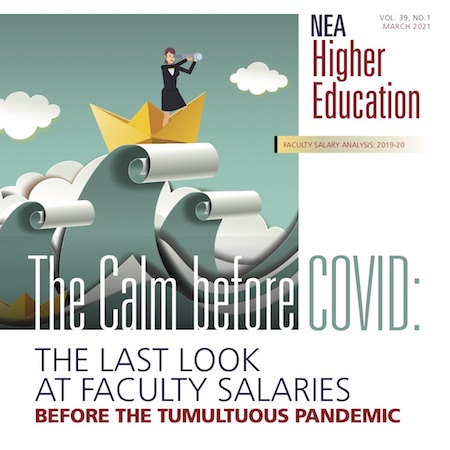 A new report from the National Education Association presents a snapshot of faculty in higher education and their compensation just prior to the onset of the global COVID-19 pandemic. Once the pandemic hit, colleges and universities announced furloughs, temporary layoffs, cut salaries, and eliminated many faculty positions. So, next year’s report may present an entirely different situation than the number presented here.
A new report from the National Education Association presents a snapshot of faculty in higher education and their compensation just prior to the onset of the global COVID-19 pandemic. Once the pandemic hit, colleges and universities announced furloughs, temporary layoffs, cut salaries, and eliminated many faculty positions. So, next year’s report may present an entirely different situation than the number presented here.
The report finds a large pay gap for faculty who teach at historically Black colleges and universities compared to their colleagues at predominantly White institutions. The salaries paid to HBCU faculty are lower than the salaries paid to faculty elsewhere, and the gap persists across institution types. The average difference is about $18,000, with faculty teaching at HBCUs earning $69,180, on average, compared to $87,384 for faculty at non-HBCUs.
The gap is greatest at research universities. Faculty at all research universities had an average salary of $96,451 compared to an average salary of $72,418 at historically Black research universities.
The pay gap at research universities in some states is huge. For example, full professors at Alabama State University and Alabama A&M University, two historically Black doctoral institutions have an average salary of about $93,000. At the University of Alabama, full professors have an average salary of $152,700. At North Carolina A&T State University, the nation’s largest HBCU, full professors have an average salary of $102,500. At the University of North Carolina at Chapel Hill, full professors earn, on average, $160,800 annually.
The full study, The Calm Before COVID: A Last Look at Faculty Salaries Before the Tumultuous Pandemic, may be downloaded by clicking here.













This so-called “pay gap” reflects differences in the cost of living across the country (it’s cheaper to live in the South), as well as differences in workload, qualifications and skill sets. “Race” is a relatively small factor in compensation these days.
I would expect for someone with your extremely “low intelligence” to justify this blatant salary disparities. ‘ewart’, you continue to reveal your Neanderthal mentality in the 21st century.
This is nothing more than another status quo and neoliberal report from the racist NEA (in my opinion) because it fails to mention how these salary gaps exist due to racist state and federal funding policies and practices (i.e., CoE v MHEC, Ayers v Fordice, etc.). For those who dissent, please spare me with “it’s due to the amount of alumni(a) donation via matching funds” narrative. The facts remain, the overall funding for HBCUs (public) still conducts itself akin to a budgetary 21st century Jim Crow system.
The wealth of a university is not closely correlated with the average salaries of its professors. There is a relationship, but it is a modest relationship.
For example, Harvard is by far the wealthiest university in the country, but Stanford pays its professors higher salaries, presumably because of the sky high cost of living in California. Columbia has an endowment that is less than 30% of Harvard’s, but faculty salaries are nearly the same at the two schools. MIT is a relatively poor university, but its faculty are almost as well paid as Harvard profs.
Your feebleminded and inept comments are starting to become quite a BORE.